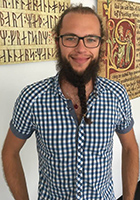Summer School in Scandinavian Manuscript Studies
Tomorrow sees the beginning of the 15th annual Summer School in Scandinavian Manuscript Studies held in cooperation between the Arnamagnæan Institute, the Árni Magnússon Institute for Icelandic Studies in Reykjavík and the National and University Library of Iceland.
The summer school is a 2-week intensive course in medieval and early-modern Scandinavian manuscript studies. Consisting of lectures, workshops, excursions and special presentations, the summer school offers its participants basic training in palaeography, codicology and transcription of manuscripts, as well as in-depth workshops on editorial technique and textual criticism.
The teaching is undertaken by members of staff at the cooperating institutions - among them some who were once students of the summer school. It is held alternately in Reykjavík and Copenhagen, and this year our colleagues at the Árni Magnússon Institute for Icelandic Studies in Reykjavík will host.
Last year in Copenhagen, we asked a few of our students and instructors why they'd chosen the summer school and whether they'd recomend it to others. If the summer school catches your fancy, please check back at the beginning of 2019 for more details on how to register for the summer school in Copenhagen next year.
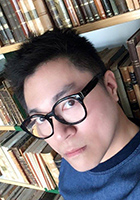 Garfield Lam, Corporate Archivist, HSBC (Basic group)
Garfield Lam, Corporate Archivist, HSBC (Basic group)
Studying medieval manuscripts is a niche yet demanding specialty with the archival field and working as an archivist I need to develop my own expertise in the industry. By joining this course I am not only developing this speciality for my current work but also consolidating and extending my existing knowledge gained in Germany and England, in languages other than German and English. I am also fascinated by Scandinavian culture, especially the Danish and Icelandic histories.
Getting up close and personal with the Arni Magnusson collection is a real privilege as working with and researching different well-known collections is every archivist’s dream! Also meeting with classmates and teachers from all walks of life is truly inspirational and encouraging.
I will hopefully participate in the advanced course as the combination of theoretical and practical studies is definitely challenging yet balanced. Also the lecturers involved in this course are all experts in Scandinavian studies so I am certainly learning the best from all of them.
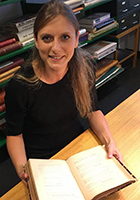 Katarzyna Kapitan, PhD student at the Arnamagnæan Institute (Teacher)
Katarzyna Kapitan, PhD student at the Arnamagnæan Institute (Teacher)
Thinking of my first summer school makes me a bit sentimental; that's where the idea for my current Phd project was born and where I met the supervisor of my ongoing project.
The Arnamagnaean Summer school is a place where a community of manuscript scholars and students can meet and discuss perspectives and challenges of contemporary manuscript studies. The summer school has a unique atmosphere, which builds on common interests, eagerness to learn and passion to teach. I feel honored that I had a chance to learn from the leading scholars in the field of Scandinavian manuscript studies and now to share my knowledge and experience with my students.
Teaching at the summer school gives a lot of satisfaction. It is great to teach a group of students who are passionate about the subject. It is wonderful to see how each day they become more conscious about the methodology of the discipline, more critical in their questions and comments, and more confident in their abilities.
We don't make it simple for the students, we challenge them every day and it is wonderful to see how much they can learn in just two weeks. The teaching philosophy of the summer school is a collection-based teaching which emphasizes active learning. Students work in small groups and have a unique chance to explore history of the manuscripts on their own, under the close supervision and guidance of the researchers and conservators.
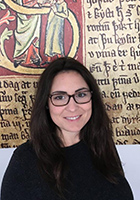 Ana Piñera, Goethe-Universität Frankfurt am Main (Advanced group)
Ana Piñera, Goethe-Universität Frankfurt am Main (Advanced group)
The Summer School in Manuscript Studies in Iceland last year left us attendees wanting more hands-on experience with both medieval and post-medieval manuscripts. This is why I, and many others, came back this year to take part in the advanced course, this time in Copenhagen. It was very exciting to have even more time with the manuscripts this year, and I especially enjoyed the visit to the conservation workshop and our hunt for watermarks during one of the workshops. In addition, just as last year, we got to work with competent and inspiring scholars, both early career and established scholars. For these and several other reasons (friendly and productive atmosphere, social activities, excursion, etc.), I highly recommend taking part in this high-quality programme. I wish to thank all participants, the organising committee and I hope I will see everyone next year in Reykjavík.
Johan Bollaert, Uppsala universitet (Master class)
I first heard about the summer school from some colleagues about 3 years ago. That year I took part in the beginners course in Iceland and was hooked ever since. It's amazing to be able to spend these two weeks with fellow students and friends who share an interest in the Old Norse manuscript culture. Of course I'm glad I made it to the master level now, but I'll miss the course next year.
What I like the most this final year is that we're engaged in hands-on team work. We get to work on our own project with a clear goal in front of us, and in the meantime we also have to train our communication skills and learn to work as a team with colleagues who might have a different focus in their studies.
Of course I would recommend it. The course is a solid step deeper into the Old Norse field and the international atmosphere offers every student a chance to broaden their horizon.
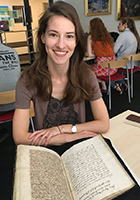 Sheryl McDonald Werronen, postdoc fellow at the Arnamagnæan Institute (Teacher)
Sheryl McDonald Werronen, postdoc fellow at the Arnamagnæan Institute (Teacher)
I first attended the summer school in 2011 as a PhD student on the recommendation of my supervisor, so that I could get specialist training in Icelandic palaeography and codicology -- something that wasn't available at my home institution.
Completing all three levels of the summer school has changed how I approach Old Norse studies: I can't imagine researching Old Norse literature without also investigating the manuscript tradition and reception history. I also became much more interested in post-medieval Icelandic literature and manuscripts after the summer school, and this is the type of material I now work with as a postdoc. This year, a highlight for me was helping to introduce the students in the basic group to post-medieval manuscripts.
I would recommend the summer school to people researching anything to do with Old Norse literature or history because learning how to work with and read manuscripts, or how to collect variants and prepare an edition, gives you new insights into your primary sources. It's also simply a lot of fun to work with manuscripts, especially if you've never had the chance to before!
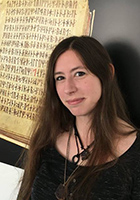 Juliane Tiemann, Universitetet i Bergen (Advanced group)
Juliane Tiemann, Universitetet i Bergen (Advanced group)
The summer school provides an environment to get to know scholars/researchers who are working in the same field and build up a great network. During classes and workshops, a discussion with those scholars and researchers is a lot easier than during conferences and there is enough time for longer dialogues about ongoing projects in medieval studies. Bonus: I could get some useful input concerning my own work. Since the programme includes workshops on the topics of the classes during the two weeks, the theoretical knowledge can be transferred into practice on the spot (which is difficult at other institutions) and thus involves training with tools used in this kind of studies. The Summer School also offers excursions! So aside from building up a scholarly network, we also got together in social events.
I did the basic class several years ago (also in Copenhagen) - at the time as a graduate student - as an addition to the studies in Germany and as an opportunity to go further in my own studies. This year I could build on that knowledge and further studies involving my PhD-project in the advanced group.
I recommend this Summer School to every student - no matter of BA/MA or PhD - who works with Scandinavian medieval manuscripts! It is a wonderful opportunity to get to know others working in the same field and to get practice in the studies with manuscripts! I will definitely come back for the last part of the Summer School next year!
Kontakt
Katrín Þórdís Driscoll is a research assistant at the Dept. of Nordic Studies and Linguistics.
Telephone: +45 3533 1660
katdris@hum.ku.dk

